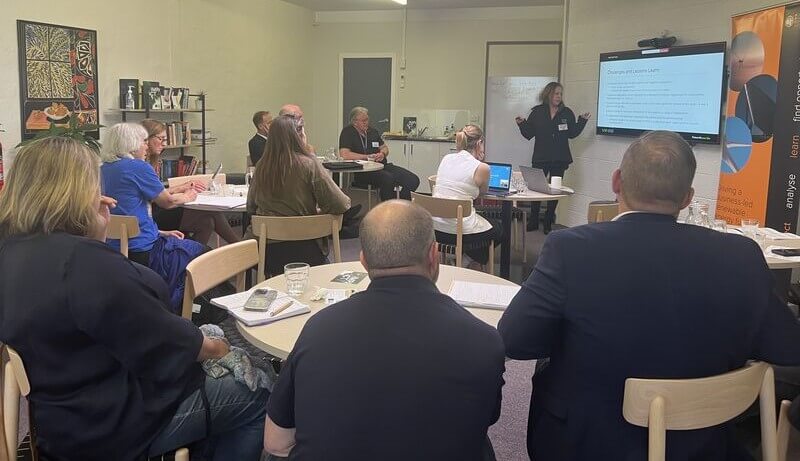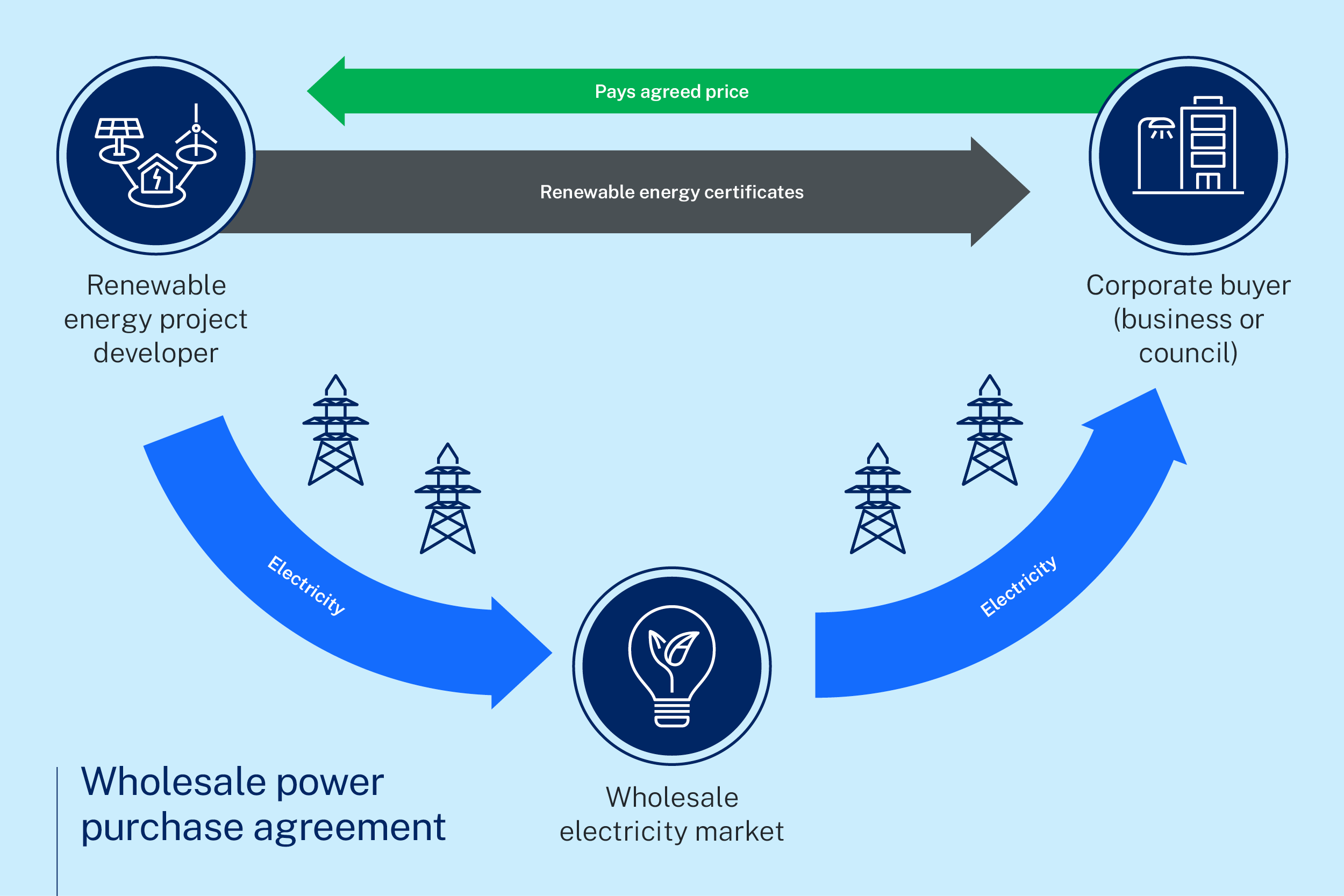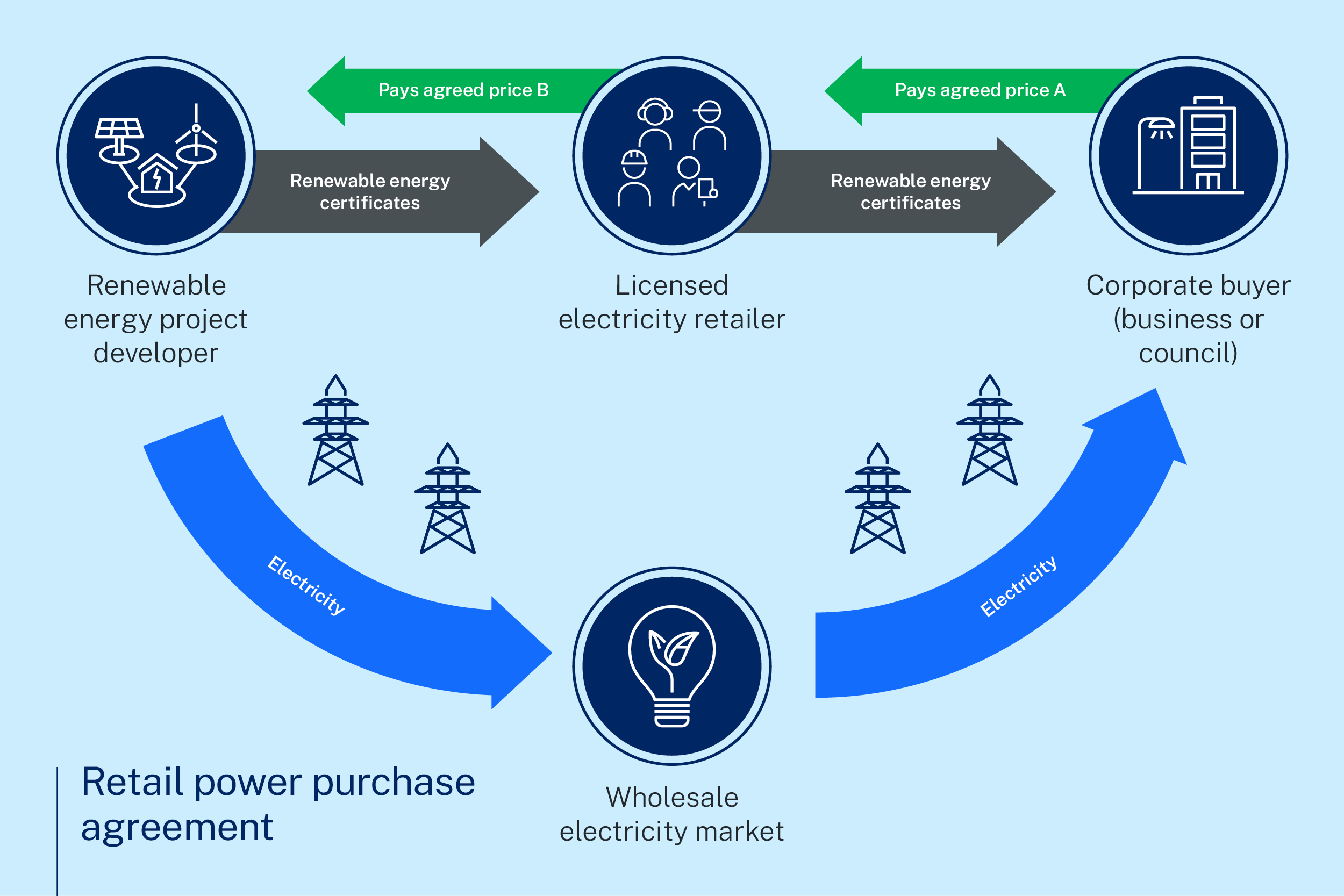Power purchase agreements: Win-win for energy buyers and energy sellers
We recently announced that we’ve partnered with the Business Renewables Centre Australia (BRC-A) to run a series of education workshops about renewable energy power purchase agreements (PPAs) for councils and businesses.
We've done this because PPAs are a key tool in the energy transition. They enable businesses to buy and use renewable energy directly from the source, making it cheaper and more secure.
PPAs also help government, businesses and other organisations meet net zero emissions goals and support the decarbonisation of the Australian electricity grid. They provide financial certainty for renewable energy projects and energy certainty for businesses.

The Business Renewables Council of Australia (BRC-A) runs a power purchase agreemend education session in Armidale, NSW.
What are PPAs and how do they work?
A PPA is a contract between an energy buyer, like a business, council or buyers’ group, and an energy seller, usually a project developer or electricity retailer. It is a contract for a fixed-price and fixed-supply of renewable energy, making it cheaper for businesses to use.
We’ve written this article for the energy buyer to demystify the process and explain the benefits.
PPAs guarantee that you, the buyer, can purchase energy from renewable energy projects like offsite solar farms or wind farms at an agreed price, volume and term.
They’re a win-win solution for both the project developer and you as the energy buyer.
Australia’s National Electricity Market (NEM) is where electricity is bought and sold on Australia’s eastern seaboard. Spot prices on the NEM fluctuate every five minutes. Volatility is a key feature of how it works, but it can be risky for those who are exposed to this.
In a PPA, an energy supplier (either a retailer or project developer) can contract with you to remove some of this volatility by locking in a price.
Compare residential electricity plans with Energy Made Easy
PPAs aren’t an option for household consumers or small businesses.
However, if you want to compare electricity plans or find a retailer that supports renewables, you can check out the Australian Energy Regulator's free website energymadeeasy.gov.au
What are the benefits of a PPA?
PPAs provide financial certainty for renewable energy projects. They are a bankable contract that developers can use to obtain project finance.
PPAs offer a range of benefits for the buyer and communities more broadly. These benefits include:
- Price stability: By locking in a fixed electricity price for a set period, organisations can protect themselves from fluctuating market rates
- Net zero goals: Purchasing renewable energy demonstrates a commitment to environmental responsibility and helps reduce greenhouse gas emissions
- Community benefits: Renewable energy projects help to create jobs, boost local economies, and enhance community infrastructure, support local biodiversity and heritage values and projects, and depending on the project, may bring direct investment in the community.
Who can benefit from PPAs?
- Local governments: Councils can use PPAs to reduce energy costs, support local renewable energy projects, and contribute to community sustainability goals
- Businesses: Large and medium businesses can benefit from PPAs by securing stable energy prices, reducing carbon footprints, and showcasing leadership
- Energy buyers’ groups: These are groups of organisations that come together to negotiate PPAs themselves, improving pricing and facilitating greater collective impact
- Industry: Energy-intensive industries such as manufacturing and mining can significantly reduce their electricity expenses through PPAs
- Educational institutions: Universities and schools can lower energy costs while demonstrating a commitment to sustainability to students and the community
- Healthcare facilities: Hospitals and clinics can achieve cost savings and improve their environmental performance with PPAs
- Property owners: Commercial property owners can increase property values and attract environmentally conscious tenants by sourcing renewable energy through PPAs.
Types of PPAs
There are two main types of PPAs:
Wholesale PPAs
Wholesale PPAs are an agreement between energy users and the project developers.
- These are generally available to organisations with high energy consumption (over 60 gigawatt-hours per year), and who purchase their electricity direct from the market. They’re sometimes called ‘financial’ PPAs or ‘Contracts for Difference’.
- If you’re considering this option for your organisation, you’ll need to have the risk appetite and internal resources to manage price hedging.
- Since this is a financial contract, if you’re purchasing electricity through a wholesale PPA, you’ll also have a standard retail electricity contract to ‘keep the lights on’ for your operations.
- These contracts generally have greater sustainability impact than retail PPAs (see below) where they support new solar or wind farms. That’s because they add new renewable electricity to Australia’s grid, which means your organisation is really supporting additional renewables on the grid.
- You could consider a wholesale PPA if your organisation falls into one of these categories:
- Mining, heavy industry and utilities
- Industrial and food processing
- Large commercial businesses with multiple properties such as banks, supermarkets and asset managers
- Data centres, ICT and universities.

Wholesale power purchase agreements are between energy users and the project developers.
Retail PPAs
Retail PPAs are where your organisation contracts with an electricity retailer, and the retailer in turn secures renewable energy supply from a project developer.
- These PPAs are available to large and medium energy consumers (over 5 gigawatt-hours per year, with no upper limit).
- This type of contract replaces your organisation’s current standard retail electricity contract. There are several types available, and they may vary in the amount of renewables included and whether or not you are partially exposed to market volatility.
- You could consider a retail PPA if your organisation is any of the ones listed above, or if it falls into any of the categories below:
- Commercial businesses or property owners with moderate to high energy consumption (single or multiple sites)
- Professional services firms, such as insurance health insurance companies, law firms, media companies
- Retailers, local government and private schools
- Groups of energy buyers pooling their load through a buyers’ group.

Retail power purchase agreementss are between an electricity retailer, a project developer and an energy user.
There is no one-size-fits-all PPA
There is no one-size-fits-all solution for a PPA, and the contract terms can vary significantly from one PPA to another. This is because each PPA is the result of a negotiation, to strike terms that work for you, the buyer and the company selling the electricity.
Negotiations usually also involve deciding what will happen with renewable energy certificates (also known as large-scale generation certificates, or LGCs), which are proof of renewable energy generation under Australia’s Renewable Energy Target.
Negotiations can be a complicated process. This is why EnergyCo is working with BRC-A to deliver detailed training on the process. BRC-A has developed training and resources that are moving industry towards standardising the process and supporting organisations to ‘go renewable’ sooner.
How are PPAs good for regional economies?
PPAs support the development of renewable energy projects in regional areas, while also giving businesses and other organisations like councils a chance to tap into secure and affordable energy supply.
These projects can:
- Support employment opportunities
- Help reduce energy costs long term
- Diversify economies
- Attract new businesses
- Support community benefits funding.
For more information about benefits to regional economies, check out our Community and Employment Benefit Program page.